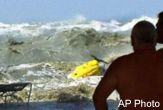Voice of Reason: The Myth of Tsunami Survivors' Sixth Sense

Get the world’s most fascinating discoveries delivered straight to your inbox.
You are now subscribed
Your newsletter sign-up was successful
Want to add more newsletters?
Join the club
Get full access to premium articles, exclusive features and a growing list of member rewards.
Shortly after the Dec. 26, 2004 tsunami tragedy, stories and news reports appeared making claims that animals and aboriginal tribes had escaped the danger because they possessed a mysterious "sixth sense" that somehow warned them in time. For example: "no dead animals have been found as a result of the tsunami, confiming animals' sixth sense" and "no one has found dead animals in the aftermath of the earthquake and tsunami" (Note 1).
These reports are simply incorrect. Many news and eyewitness accounts described dead animals among the debris and carnage. The Washington Post, for example, reported, "In the coastal town of Velanganni...volunteers wearing face masks drove around in trucks Tuesday, picking up cattle carcasses..." (Note 2)
So dead animals were found--but were they found in fewer numbers than some might have expected? To begin with, it's unclear how many animals would be expected to have been killed by the tsunami, since coastal regions don't necessarily have a high concentration of large animals to begin with.
But for the sake of argument, let's say that fewer animals were killed than some might have expected. Is this evidence of a paranormal "sixth sense?"
The fact that animals often have keener senses than humans is obvious and well-documented. Dogs have a remarkable sense of smell, birds can migrate using celestial cues, and bats can locate food with echoes. (Though animals' other senses are often worse than those of humans -- elephants have very poor distance vision, for example.) Animals may sense unusual vibrations or changes in air pressure coming from one direction that suggests they should move in the opposite direction. Let's say a herd of animals are seen fleeing to higher ground. All that is needed is for one or two of them to skittishly sense danger and head out; the rest will follow, not necessarily due to some preternatural sense but simple herd instinct.
Similarly, members of primitive tribes who inhabit the Andaman and Nicobar Islands are said to have been forewarned: "They can smell the wind. They can gauge the depth of the sea with the sound of their oars. They have a sixth sense which we don't possess" (Note 3). (The "sixth sense" label is a bit of a myth anyway, since the human body has other senses, such as balance and pressure, that are not counted in the usual five.)
As with the animals, one needn't posit a mysterious sixth sense; the other five are more than capable of warning about impending danger. The fact that an ancient seafaring people (as opposed to, say, German tourists on holiday) might recognize the signs of an impending tsunami is hardly surprising. In the aftermath of the tragedy, many miraculous stories of courage and survival emerged, but tales of supernatural abilities aren't among them.
Get the world’s most fascinating discoveries delivered straight to your inbox.
Notes:
1. See www.crystalinks.com/tsunami1204a.html.
2. Lakshmi, Rama. 2004. After sea surges, water could kill in other ways. The Washington Post, Dec. 29; Page A11.
3. See www.nativeamericanchurch.com/Signs/SixthSenseTsunami.html.
Benjamin Radford is a writer and editor for Skeptical Inquirer magazine. His latest book is "Media Mythmakers: How Journalists, Activists, and Advertisers Mislead Us."
Related Stories

 Live Science Plus
Live Science Plus










